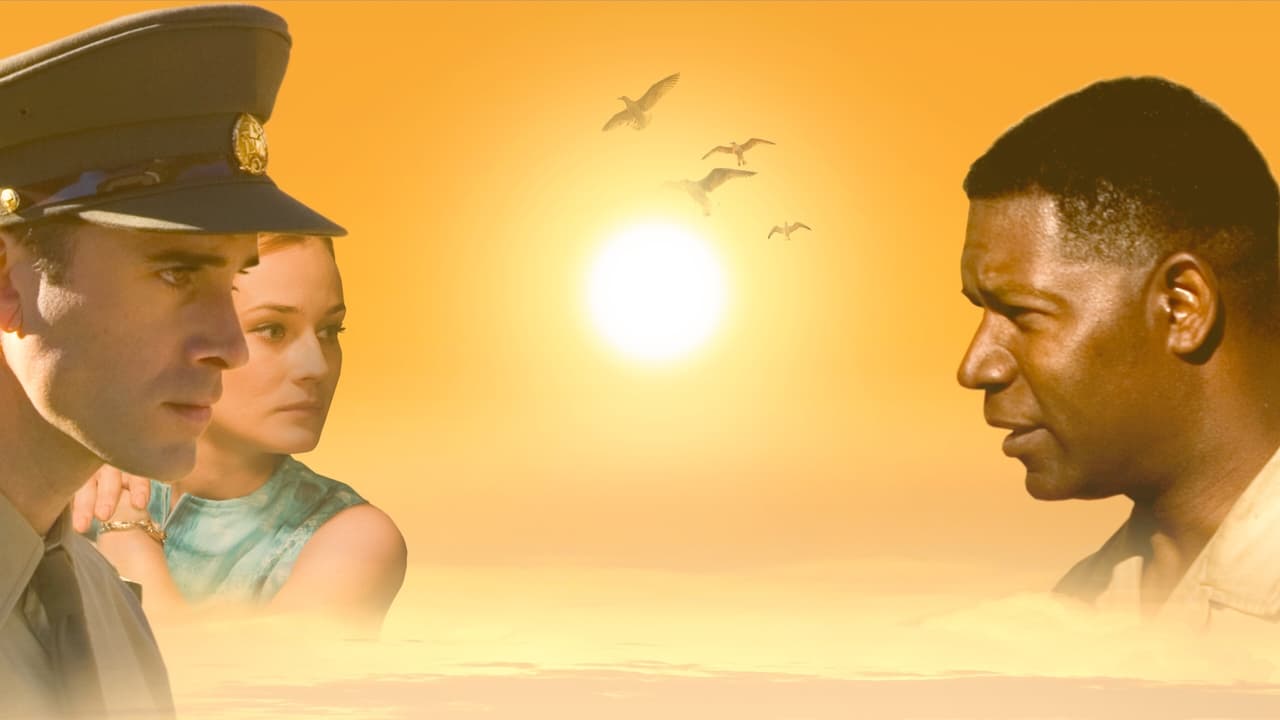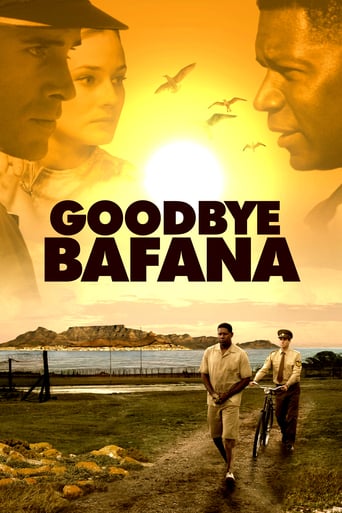

Any movie that deals with Nelson Mandela is a movie worth watching in my opinion. He is perhaps the only person in the world I can think of to whom I would apply the adjective "great." He was a man who could have lived in bitterness and anger all his life, seeking revenge when he finally achieved power, but who instead chose to devote himself to democracy and peaceful reconciliation between blacks and whites in South Africa. This movie, which I saw under the title "The Color Of Freedom," is interesting because although it deals extensively with Mandela, doesn't actually look at events from his perspective. The story is actually told from the perspective of James Gregory (played convincingly by Joseph Fiennes) - who as a prison guard slowly advancing up the ranks - met Mandela (played by Dennis Haysbert) in 1968 and gradually developed a relationship of trust and respect with him.There's enough background information to give the viewer a taste of what South African life was like under apartheid, but the story isn't really about that. It's more a story of Mandela's impact on Gregory. At the start of the movie, Gregory came across as basically just another white South African, committed to apartheid and devoted to maintaining the white hold on "their" country. But slowly, as Gregory comes to know Mandela, he changes. Mandela's graciousness as well as his fierce devotion to his cause impacts Gregory, who suddenly begins to see Mandela not as a black terrorist out to kill whites but as a human being seeking basic dignity and equality.Fiennes performance was very strong. Haysbert had a tough challenge. It surely isn't easy playing a man who is literally a living legend. He did well with the part, but it was difficult to accept him as Mandela. The portrayal of the racism that was so deeply ingrained in South African society was at times almost painful to watch. I suppose the biggest weakness of the story is that it's been denied by many people - apparently including Mandela. He did develop a strong relationship with one of his white guards, but it wasn't Gregory, who seems to have taken some liberty in the account he shares in his book, from which the movie was made. He is unfortunately dead and unable to answer to those criticisms. Still, this is a moving story, and there is truth behind it apparently, and it clearly established the qualities that made Mandela the great man he is, who accomplished the great things he managed.
... View MoreSeems quite sad that the true-to-life character of Nelson Mandela would be reduced to a supporting character in a film about him; his stay on the Robben Island prison and his consequent release in the 1990s. Truth is, Bille August's 2007 film has a head and a heart in two different places; his film more closely resembling the sort of thing your bog-standard GCSE teacher might slap on for the students in class, before nipping out for a quick cigarette, during the week that sees the school syllabus demand South African Apartheid era be studied. But despite all this, it didn't bother me as much; the film observing the changing attitudes of a prison guard on the aforementioned island jail and using him as an example of which the greater changing attitudes of a nation at that time are templated. Yes, it resembles a TV movie of the week and yes, at about the half way mark you can envisage the film's final few moments consisting of a little white text caption coming into focus on the black background detailing what the lead character's current state is; but above all this is a film wanting to tackle a white individual's guilt rather than a black individual's plight and with this established pretty early on in the film, I did not have a problem with the direction the film took.Goodbye Bafana revolves around a pro-white; pro-Apartheid guard with the South African prison service named James Gregory, played by Joseph Fiennes, who moves to Robben island with his family of wife Gloria (Kruger); young son Brent and daughter Natasha in the 1960s. James is a censor officer, cutting out words and sentences from inmates' letters and having the authority to listen in on conversations inmates have with their visitors; cruelly cutting them off if he deems it fit to do so in that they break the house rules. The very first scene is the family shipping themselves off to the island, a sense of life beginning at this point. James is the focus here, his family relegated to mere items of viewership with the children playing roles that see them ask the questions that ill-informed on Apartheid audience members will be asking; Diane Kruger, the relatively talented actress, not given anything to do bar be relegated into playing the role of the token fascist whose racial tidbits sum up an entire mindset of an era. "Why are the blacks prisoners on the island?" asks Brent; "Because they're terrorists who want our land." replies Gloria, in a fabricated and false manner. Then we remember this is playing to GCSE students whom are unfamiliar with the subject and it is they who are asking with the programmed response kicking in.James is the bridge between a shallow, vacuous existence in his wife's-plus-her friends' empty existence on the island and the gruelling, grotty prison set life of a number of imprisoned blacks whom it is deemed are enemies of the state. One of these is the aforementioned Nelson Mandela, played here by Dennis Haysbert, who does a reasonable job shuffling from scene to scene and keeping a stern and expressionless face in playing the man; although the level of the performance cannot be understated when we recall what it is Haysbert is exactly required to do: essentially playing a dispirited prisoner throughout and given little room to play the equality driven saviour of a nation and its beliefs.Interestingly, the moment that encapsulates the very sentiment that the film is more interested in Gregory's tale than Mandela and his struggle and the manner in which he went about doing what he did actually occurs very late on, but it's telling all the same; in a sequence that sees Mandela and his assistants sit around a large table about to indulge in the sorts of discussions that saw them do what they did but sees James leave the room with the film following him, just as those at the table appear to get started, so as to cover his moving house and his family problems. Akin to this is James' gradual arc of realisation, something that's satisfying in its very basic observation; the man's past life experience in knowing a young black boy in his youth proof he was once able to connect with blacks in a friendly manner with moments such as the reading of some kind of Mandela written equality charter just foreshadowing the obvious. As the years roll on and everyone grows older, the Gregory's shift around and Mandela himself is kept on the sidelines as he changes prisons looking at the main strand of the film from a distanced perspective. It's a situation akin to John Boorman's 2005 film Country of My Skull (In My Country, to Americans), when the plight and strife of oppressed South Africans and their justice is given the odd glance in tangent to a Caucasian individual or individuals and their relationships with other Caucasians around them plus whatever hardships they suffer with their employers. It isn't reason enough to hate the film, but it's reason enough to get a little flustered provided you can identify the niggling frustrations and work around them so as to enjoy the film as it stands. The film tries to provide some dramatic tension to proceedings, the arrival of a new and more brutal Robben Island chief of staff later on in life supposed to instill a sense of what might happen if Gregory were to be caught by this new chief as his attitudes begin to change. Goodbye Bafana was made with the best of intentions, achieving what it sets out to do with relative dramatic and respectful aplomb, but one cannot argue that it all too often feels like a low-key retelling of events for those naive to the subject matter.
... View MoreJames Gregory, a South African man, chronicled his experiences as a soldier in a book about those the dark days of Apartheid, and its demise, when Nelson Mandela was freed after twenty seven years in prison. Bille August, the Danish film director decided to bring the story to the screen adapting the events that lead to the democratic government now in place.As a young boy, James Gregory's best friend was a black lad who knew about the difference between the races at a moment when the ruling white minority ruled the country in ruthless fashion. James went on to become a soldier who is sent to Robben Island where a lot of political prisoners, among them, Nelson Mandela was being held. The reason he was sent to the island was his understanding of the Xhosa dialect. Because of his knowledge he was supposed to report anything to the higher ups as the job had him censuring the prisoners' correspondence.At first James acts with complete disregard to the conditions in jail. A chance encounter with the star prisoner, made him reflect on what the dignified man himself, had to say. He is bowled over when he finds the manifesto that Mandela himself had written and was what was instrumental for landing him in jail. Gregory began to see how justice was applied to the blacks that were living in dismal conditions and forced to hard labor.As James Gregory begins to get a clear picture of what really is going on, he begins to feel the rejection of his fellow soldiers. They see in James a traitor who is now a threat to their way of life. James Gregory gave away many secrets that resulted in the assassination of a lot of the blacks that were considered communist terrorists, something that he lived to regret throughout his life.The film second half tells the story how two different men from such disparate backgrounds begin to respect one another as they bond because both see the real problem that have helped to create the racial injustice.Joseph Fiennes is seen as James Gregory. He ages throughout the narrative, something that is not totally convincing, but one has to make concessions when the same actor is asked to do this type of role. Dennis Haysbert makes a dignified and serene Nelson Mandela with his commanding voice and getting the inflections of this leader's speech. Diane Kruger plays the long suffering Gloria who is brought up in a segregated society, not realizing the injustice being committed to the population at large.
... View MoreThis film, based on two very important men, is emotional and sincere but overall it is believable, every single moment is significant and told gracefully. A real life movie based is supposed to be precise without getting too much into detail - otherwise it turns boring - and so is "Goodbye Bafana", documenting 27 years in the life of this prison guard. Things and events described in the motion picture heat up gradually, the leading actors are simply outstanding so that the two hours runtime seems much shorter than it is. Haysbert is terrific, even more than Fiennes and they're both superb for their parts, with them each moment becomes increasingly more touching
... View More